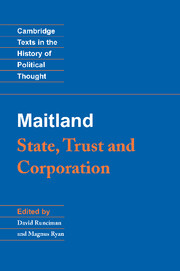Book contents
- Frontmatter
- Contents
- Acknowledgements
- Editors' introduction
- Note on the text
- Bibliographical notes
- Biographical notes
- Glossary of technical terms
- Preface
- The Essays
- 1 The Corporation Sole
- 2 The Crown as Corporation
- 3 The Unincorporate Body
- 4 Moral Personality and Legal Personality
- 5 Trust and Corporation
- Index
- Cambridge Texts in the History of Political Thought
1 - The Corporation Sole
Published online by Cambridge University Press: 05 June 2012
- Frontmatter
- Contents
- Acknowledgements
- Editors' introduction
- Note on the text
- Bibliographical notes
- Biographical notes
- Glossary of technical terms
- Preface
- The Essays
- 1 The Corporation Sole
- 2 The Crown as Corporation
- 3 The Unincorporate Body
- 4 Moral Personality and Legal Personality
- 5 Trust and Corporation
- Index
- Cambridge Texts in the History of Political Thought
Summary
Persons are either natural or artificial. The only natural persons are men. The only artificial persons are corporations. Corporations are either aggregate or sole.
This, I take it, would be an orthodox beginning for a chapter on the English Law of Persons, and such it would have been at any time since the days of Sir Edward Coke. It makes use, however, of one very odd term which seems to approach self-contradiction, namely, the term ‘corporation sole’, and the question may be raised, and indeed has been raised, whether our corporation sole is a person, and whether we do well in endeavouring to co-ordinate it with the corporation aggregate and the individual man. A courageous paragraph in Sir William Markby's Elements of Law begins with the words, ‘There is a curious thing which we meet with in English law called a corporation sole’, and Sir William then maintains that we have no better reason for giving this name to a rector or to the king than we have for giving it to an executor. Some little debating of this question will do no harm, and may perhaps do some good, for it is in some sort prejudicial to other and more important questions.
A better statement of what we may regard as the theory of corporations that is prevalent in England could hardly be found than that which occurs in Sir Frederick Pollock's book on Contract.
- Type
- Chapter
- Information
- Maitland: State, Trust and Corporation , pp. 9 - 31Publisher: Cambridge University PressPrint publication year: 2003
- 5
- Cited by

